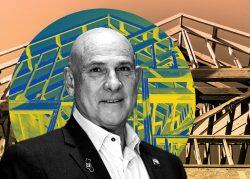A Sacramento developer has sued the city of Manhattan Beach, which ran afoul of state housing regulators after rejecting a 79-unit apartment complex.
Highrose El Porto, run by developer Frank Buckley, filed the lawsuit asking the court to reverse the City Council’s denial of the four-story project at 401 Rosecrans and 3770 Highland avenues, the Torrance Daily Breeze reported.
The developer seeks damages equal to its loss of investment.
“This case highlights the continuing struggle between the legislatively declared critical statewide need for affordable housing,” the lawsuit states, and “mobilized anti-development (folks) who lobby and cajole their elected officials into stopping further development in their communities at any cost.”
Mayor Steve Napolitano declined to comment on the litigation. The council is expected to discuss it in a closed session this week.
Buckley’s proposal called for a 40- to 50-foot high building on a triangle-shaped lot with 79 studio, one-, two- and three-bedroom apartments, of which six would be set aside as affordable, according to Urbanize Los Angeles. An underground garage would serve 127 cars.
The project, dubbed Highrose El Porto, would replace the Verandas Beach House event center and Tradewinds Village retail building. The two merged lots would allow for the Highrose project south of a Chevron oil refinery located in El Segundo.
The extended gray, turquoise and white building, designed by Torrance-based Withee Malcolm Architects, would include a pool, yard and terrace patio decks.
The developer received administrative approval — allowed under state law because of the six affordable units included in the 96,200-square-foot complex. Residents of the upscale South Bay city then appealed to the Planning Commission, which approved the project.
Residents then appealed to the City Council, which finally rejected the project in October, saying they weren’t willing to approve an unconventional building near the oil refinery that could impact the health and safety of residents – despite other housing in that area, according to the Breeze.
“Allowing people to dwell adjacent to known sources of air pollution must be mitigated by extended buffer zones,” Napolitano, the mayor, said. “The risks cannot be mitigated. Something will go there sometime, but it shouldn’t be housing.”
The developer, in a lawsuit filed last month, said the city flouted state requirements to approve projects with affordable housing, as well as the city’s municipal code and development plans.
The California Department of Housing and Community Development also sent Manhattan Beach a letter last month saying the denial violated the Housing Accountability Act and the State Density Bonus Law.
To have lawfully denied one or more of the development standard waivers allowed under those laws, the letter said, the city had to determine specific adverse impacts the project would cause. The city didn’t do that, according to the state housing office.
The city has until Dec. 28, to respond to the state with a specific plan and timeline for corrective action, the letter said, including repealing the denial and reconsidering the project. If the city doesn’t respond, the housing department could refer the matter to the state Attorney General’s office.
“This case is not just about a city failing to comply with its own commitments to the state and the public to allow affordable housing in its jurisdiction,” Michael Shonafelt, attorney for Highrose, said in a statement. “It’s also about the rule of law and whether the citizens can rely on a city to follow its own laws and general plan.”
— Dana Bartholomew
Read more


